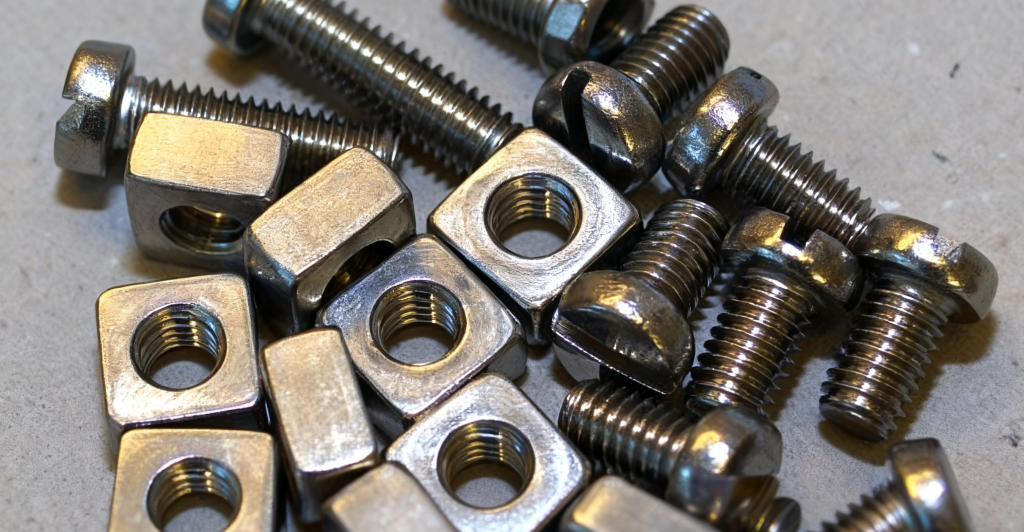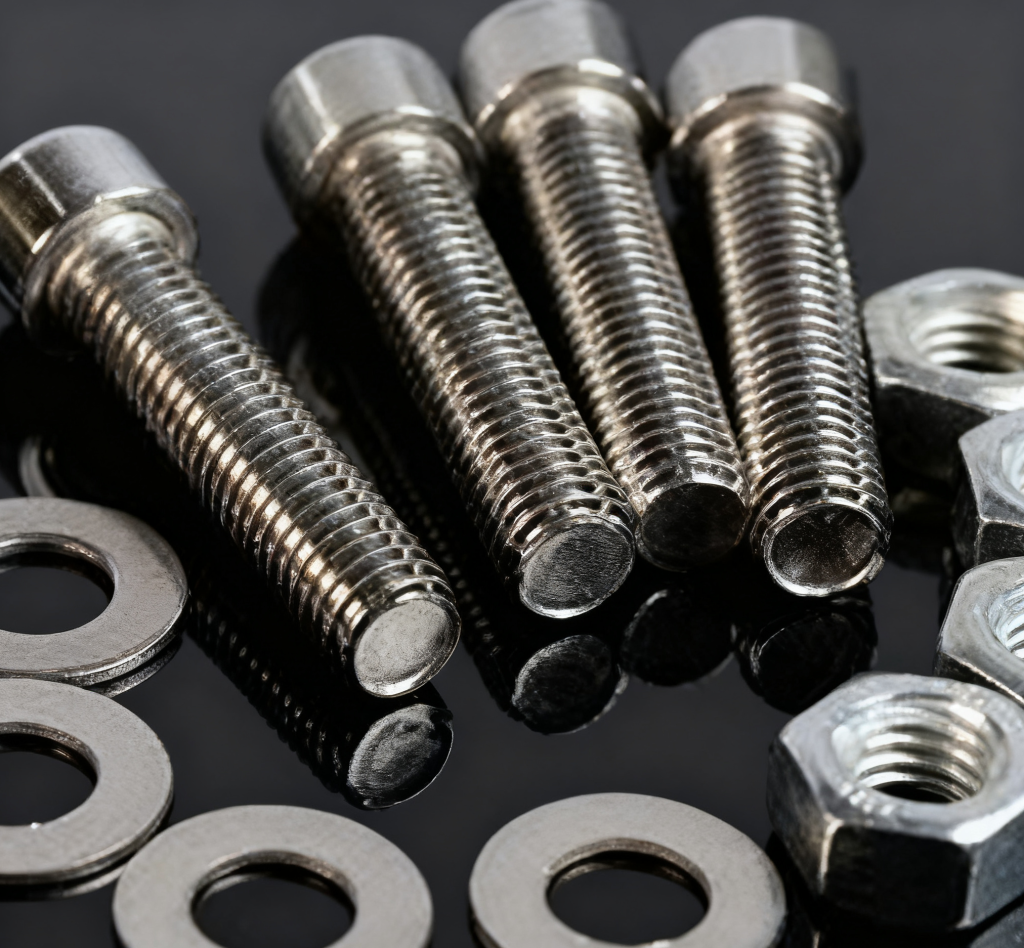Nickel alloy fasteners are critical for mission-critical industries where high strength, corrosion resistance, and high-temperature performance are essential. Welleshaft has over 10 years of experience manufacturing and exporting nickel alloy fasteners globally, serving clients in the USA, Germany, Brazil, UAE, and India. This comprehensive guide is designed for manufacturers, buyers, and engineers to understand the materials, manufacturing processes, surface treatments, industry standards, and applications of nickel alloy fasteners.
What Are Nickel Alloy Fasteners?
Nickel alloy fasteners include bolts, nuts, screws, studs, and specialty components made from high-performance nickel-based alloys. They are designed for extreme environments where traditional stainless steel fails:
-
High temperatures (e.g., jet engines, power turbines)
-
High pressures (e.g., subsea oil & gas pipelines)
-
Corrosive environments (e.g., chemical processing plants, seawater exposure)
Unlike conventional stainless steel, nickel alloy fasteners maintain mechanical integrity at temperatures exceeding 980°C (Inconel 718) and resist chemical degradation.
Materials Science of Nickel Alloy Fasteners
The performance of nickel alloy fasteners depends heavily on the alloy selection. Welleshaft manufactures fasteners from a variety of high-performance alloys:
Common Nickel Alloys
-
Inconel 625 / 718: High-strength and excellent oxidation resistance for aerospace and power generation applications.
-
Monel 400 / K500: Superior corrosion resistance in marine environments, used in valves and pumps.
-
Hastelloy C-22 / C-276: Exceptional resistance to strong acids; ideal for chemical reactors and pipelines.
-
Incoloy 800 / 825: Excellent oxidation and carburization resistance at elevated temperatures.
-
Alloy 20: Resists sulfuric acid and oxidizing media, common in chemical and petrochemical plants.
-
Nickel 200 / 201: High ductility and purity for electronics, laboratory equipment, and food processing.
Material Properties Table
| Alloy | Ni (%) | Cr (%) | Mo (%) | Max Temp (°C) | Yield Strength (MPa) | Typical Applications |
|---|---|---|---|---|---|---|
| Inconel 718 | 52 | 19 | 3 | 980 | 1030 | Aerospace engines, turbines |
| Monel 400 | 63 | 0.3 | 0.05 | 550 | 485 | Offshore platforms, pumps |
| Hastelloy C-276 | 57 | 16 | 16 | 600 | 355 | Chemical reactors, pipelines |
| Alloy 20 | 31 | 20 | 3 | 550 | 275 | Sulfuric acid processing |
| Incoloy 825 | 38 | 21 | 3 | 870 | 310 | Heat exchangers, furnaces |
| Nickel 200 | 99 | 0 | 0 | 400 | 124 | Electronics, lab equipment |
Key Takeaways:
-
Inconel 718 offers the highest strength and temperature resistance.
-
Monel 400 is optimal for marine corrosion protection.
-
Hastelloy C-22 excels in chemical plant environments.
Manufacturing Processes of Nickel Alloy Fasteners
Precision, repeatability, and strict quality control are essential in nickel alloy fasteners manufacturing. At Welleshaft, we combine advanced equipment, skilled engineering, and robust process controls to deliver high-performance fasteners for critical applications across oil & gas, marine, aerospace, and chemical industries.
Cold Forging
Cold forging is ideal for small- to medium-diameter fasteners and provides excellent mechanical performance:
-
Enhanced grain flow improves fatigue strength et tensile performance.
-
Typical tolerances: ±0.02 mm, ensuring precision for threaded rods, bolts, and nuts.
-
Advantages over machining: Higher surface finish quality and lower material waste.
Hot Forging
Hot forging is applied to large-diameter fasteners ou high-strength alloys comme Hastelloy and Incoloy:
-
Forging temperature: 950–1250°C, depending on alloy chemistry.
-
Produces superior mechanical properties compared to machining alone, including higher tensile and yield strength.
-
Reduces internal stresses and improves structural uniformity.
CNC Machining & Precision Fabrication
Pour custom or complex geometries, Welleshaft utilizes 5-axis CNC machines:
-
Achieves tight tolerances of ±0.01 mm for threaded rods, bolts, and bespoke fasteners.
-
Supports OEM and custom designs for high-performance applications.
-
Integrates with forging processes to achieve precision dimensions post-heat treatment.
Thread Rolling & Heat Treatment
Thread rolling and heat treatment are critical for mechanical performance:
-
Thread rolling improves fatigue life by approximately 30% compared to cut threads.
-
Heat treatment furnaces provide uniform hardness and tensile strength, ensuring compliance with AS9100 & Nadcap standards.
-
Process parameters are carefully controlled to maintain alloy integrity and surface quality.
Use Case: Heat-treated Inconel bolts for power generation turbines, capable of withstanding extreme temperatures.
Suggested Visual: Table showing typical hardness, tensile strength, and elongation before and after heat treatment.
Quality Control
Every batch undergoes rigorous inspection and testing to guarantee consistency and compliance:
-
CMM (Coordinate Measuring Machine) inspections for dimensional accuracy.
-
Tensile, hardness, and corrosion testing for material integrity.
-
Mill Test Certificates (MTC) ensure full traceability from raw material to finished fastener.
-
Supports compliance with ISO 9001, IATF 16949, and AS9100 standards.
Surface Treatment and Coatings of Nickel Alloy Fasteners
Surface treatment is a critical step in nickel alloy fasteners manufacturing, significantly enhancing corrosion resistance, wear performance, and service life. At Welleshaft, we combine advanced coating technologies with precision fabrication to meet high-performance industry standards pour oil & gas, marine, chemical, and aerospace applications.
Common Surface Treatments
| Treatment | Purpose | Test Results / Benefit | Typical Applications |
|---|---|---|---|
| Passivation & Pickling | Remove free iron, improve corrosion resistance | Salt spray test: 1000+ hrs without pitting | Chemical plants, petrochemical pipelines |
| PTFE / Xylan Coatings | Reduce friction, enhance chemical resistance | Coefficient of friction reduced by 40% | Moving mechanical assemblies, valves, pumps |
| Zinc-Nickel Plating | Marine corrosion protection | Exceeds NORSOK M-001 standard | Offshore platforms, shipbuilding fasteners |
| Specialized API / NORSOK Coatings | Aggressive oil & gas and chemical environments | High durability under extreme conditions | Oil & gas rigs, high-pressure pipelines |
Key Insight: Nickel alloys have inherent corrosion resistance, but surface treatments are essential to prevent localized attack, pitting, and wear, especially in high-chloride or acidic environments.
Mechanism of Corrosion Protection
-
Passivation & Pickling:
-
Creates a thin, stable oxide layer on the fastener surface.
-
Removes free iron or contaminants, preventing pitting and crevice corrosion.
-
-
PTFE / Xylan Coatings:
-
Provides a low-friction, chemically inert barrier, reducing mechanical wear and exposure to corrosive media.
-
Ideal for moving components in chemical plants or marine valves.
-
-
Zinc-Nickel Plating:
-
Acts as a sacrificial barrier, protecting the underlying nickel alloy from chloride-induced corrosion.
-
Common for offshore fasteners, ensuring compliance with NORSOK and API standards.
-
-
Specialized API / NORSOK Coatings:
-
Engineered for high-pressure, high-temperature oil & gas environments.
-
Withstands aggressive chemicals and prolonged submersion or splash zones, extending service life by 2–3x compared to untreated fasteners.
-
Practical Performance Data
| Alloy Type | Surface Treatment | Salt Spray Resistance (hrs) | Friction Reduction (%) | Application Environment |
|---|---|---|---|---|
| Inconel 625 | Passivation & Pickling | 1200 | N/A | Aerospace & power generation |
| Monel 400 | Zinc-Nickel Plating | 1500 | N/A | Marine / Offshore |
| Hastelloy C-22 | PTFE Coating | 1000 | 40% | Chemical processing |
| Alloy 20 | Specialized API Coating | 1800 | N/A | Oil & gas pipelines |

Industry Standards & Compliance of Nickel Alloy Fasteners
Nickel alloy fasteners must meet stringent standards:
-
ISO 9001: Quality management system for all processes
-
IATF 16949: Automotive industry quality assurance
-
AS9100: Aerospace and defense standards
-
ASTM / ASME / DIN: Material, mechanical, and dimensional specifications
-
Mill Test Certificates (MTC) for traceability
How Welleshaft Complies:
-
Full in-house testing: PMI, tensile, hardness, corrosion
-
Third-party verification: SGS, BV, TÜV
-
Strict lot traceability, ensuring consistent product quality
Applications by Industry for Nickel Alloy Fasteners
Oil & Gas / Petrochemical
-
Challenge: Extreme pressure and corrosive subsea conditions
-
Solution: Hot-forged Monel 400 / Inconel 625 bolts with PTFE coating
-
Result: Maintenance interval extended 40%
Marine and Shipbuilding
-
Challenge: Constant seawater exposure
-
Solution: Monel 400/K500 nuts and studs with zinc-nickel plating
-
Result: No corrosion observed after 18 months in accelerated salt spray tests
Aerospace
-
Challenge: High-temperature turbine bolts
-
Solution: Inconel 718 threaded fasteners, heat-treated and thread-rolled
-
Result: Passed AS9100/Nadcap audits, reliable performance at 950°C
Chemical / Petrochemical
-
Challenge: Acidic and oxidizing environments
-
Solution: Hastelloy C-22 and Alloy 20 fasteners with passivation treatment
-
Result: Excellent long-term chemical resistance
Nickel Alloy Fasteners vs Stainless Steel vs Titanium
| Fonctionnalité | Nickel Alloy Fasteners | Stainless Steel | Titanium |
|---|---|---|---|
| Max Temp | Up to 980°C | 400°C | 600°C |
| Résistance à la corrosion | Excellent | Moderate | Haut |
| Fatigue Resistance | Haut | Moyen | Medium-High |
| Coût | High upfront, low lifecycle | Low upfront, high lifecycle | Very high |
Insight: Higher upfront cost for nickel alloys is offset by reduced maintenance, longer service life, and reliability in critical applications.
Welleshaft Technical Capabilities & Services
-
Equipment: 800T hot forging presses, 5-axis CNC, automated thread rolling, heat treatment furnaces
-
Testing Lab: PMI, hardness, tensile, salt spray, CMM, NDT
-
Certifications: ISO 9001, IATF 16949, AS9100
-
OEM / Custom Projects: Made-to-order, bespoke fasteners
-
Global Logistics: 10+ years export experience to USA, Germany, Brazil, UAE, India
Customer Case Studies
In the harsh environment of a North Sea offshore rig, traditional stainless steel fasteners were failing under saltwater corrosion, high pressure, and constant vibration. Engineers turned to Welleshaft for a solution, seeking custom nickel alloy fasteners manufacturing capable of surviving these extreme conditions. Our team provided Monel 400 bolts with Xylan PTFE coating, precision CNC-machined to ±0.01 mm, with full Mill Test Certificates (MTC) and quality inspections. Eighteen months later, the rig experienced no corrosion and a 40% longer maintenance cycle, proving the reliability and durability of our fasteners. This success story illustrates why industries such as marine, oil & gas, chemical processing, and aerospace trust Welleshaft nickel alloy fasteners pour high-performance, critical applications, where precision, fatigue resistance, and corrosion protection are non-negotiable.
Optimized FAQ – Nickel Alloy Fasteners
Q: Which nickel alloy is best for marine use?
A: Monel 400/K500 provides optimal corrosion resistance in seawater.
Q: Can nickel alloy fasteners withstand high temperatures?
A: Yes, Inconel 718 fasteners maintain strength up to 980°C.
Q: How to source nickel alloy fasteners from China?
A: Work with an ISO-certified manufacturer like Welleshaft, offering MTCs, global shipping, and OEM support.
Q: Are nickel alloy fasteners corrosion resistant?
A: Yes, especially Monel, Hastelloy, and Inconel alloys with proper surface treatment.
Why Choose Welleshaft
-
Factory-direct manufacturing in China with worldwide shipping
-
Certified to ISO 9001, IATF 16949, AS9100
-
10+ years serving oil & gas, marine, chemical, and aerospace clients
-
Engineering support for material selection, standards compliance, and custom designs
-
Proven performance in OEM projects and industrial-scale production
Get a Fast Quote Today – Contact Welleshaft pour custom nickel alloy fasteners manufacturing.
Receive expert consultation on material selection, standards compliance, and shipping options.
1.How Do Advanced Coatings Protect Nickel Alloy Fasteners?
2.How to Achieve ±0.01 mm in Nickel Alloy Fasteners for USA/EU?

